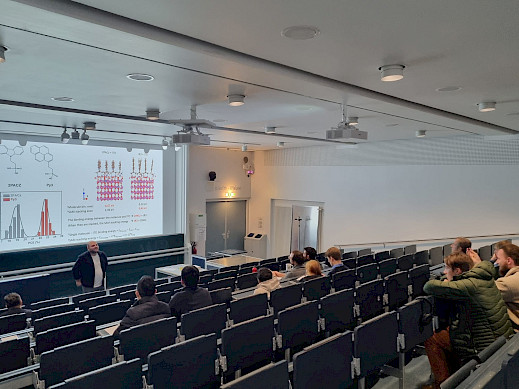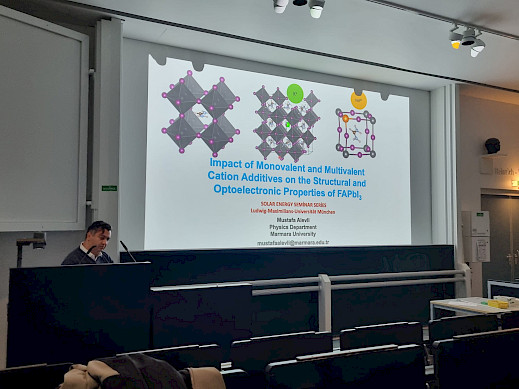Prof. Caner Deger shares computational insights into advanced photovoltaic materials in SES series!
November 21, 2024
On November 21st, 2024, Prof. Caner Deger from Marmara University visited the Aydın Research Group at LMU Munich as part of the Solar Energy Seminar Series. During his visit, Prof. Deger delivered an inspiring talk titled "Computational Insights into the Design and Optimization of Advanced Photovoltaic Materials."
In his presentation, Prof. Deger highlighted the pivotal role of computational modeling in addressing key challenges in photovoltaic material design. He discussed breakthroughs in understanding molecular contacts, defect passivation strategies, and alternatives to lead-based perovskites. His insights emphasized the importance of robust molecular architectures for carrier transport, innovative interlayer engineering for enhanced stability, and advanced strategies for tackling surface defects in lead-free perovskites. These findings serve as a roadmap for developing next-generation solar cells with higher efficiencies, improved operational lifetimes, and greater environmental sustainability.
The visit was a valuable opportunity for the Aydın Research Group to exchange ideas and explore potential collaborations with Prof. Deger. His expertise in solid-state physics and computational analysis, combined with his impressive track record of over 30 published research articles and leadership in European Union and TÜBİTAK-funded projects, provided an excellent platform for scientific dialogue.
The group greatly appreciated the opportunity to host Prof. Deger. His talk left a lasting impact, sparking discussions about integrating computational tools more extensively in photovoltaic research at LMU Munich.
We look forward to continued interactions with Prof. Deger and his team to advance our shared mission of pushing the boundaries of solar energy technologies.

Prof. Caner Deger
Also, Prof. Mustafa Alevli from the same department delivered a presentation on the structural and electronic mechanisms of potassium (K⁺) and neodymium (Nd³⁺) incorporation in FAPbI₃ perovskite layers. His talk highlighted how K⁺ doping enhances the power conversion efficiency (PCE) of FAPbI₃ perovskite solar cells by reducing trap density and accelerating charge transfer. Notably, a 5% K⁺ doping concentration eliminates I−V hysteresis but slightly compromises phase stability. This reduction in stability is attributed to the passivation of deep-level charge traps and increased carrier mobility, along with a lower phase-change activation energy. Density functional theory (DFT) calculations revealed that the primary mechanism involves the formation of KFA antisite defects.
In addition, Prof. Alevli discussed the effects of trivalent Nd³⁺ ion incorporation. He explained that Nd³⁺ doping significantly boosts photovoltaic performance by increasing open-circuit voltage and photocurrent density. At trace levels, Nd³⁺ also enhances long-term stability and improves the overall photovoltaic parameters of perovskite solar cells. These insights shed light on the dual benefits of doping strategies for optimizing both efficiency and stability in next-generation perovskite solar cells.

Prof. Mustafa Alevli